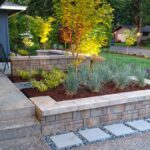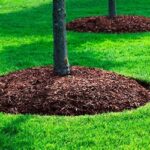St. augustine grass is a variety of grass that is popular for its dense and quick growth. It thrives in hot weather, making it an ideal choice for hot, Minnesota summers.
There are few things you can do to help get your lawn established and help the grass to grow thicker and more healthy.
Soil Testing
First thing, check out your soil. Determining the type and pH level will help you decide what prep work needs to be done. St. Augustine grass does best in sandy, acidic, well-draining soil. Keep the pH level between 5.0 and 8.5 for a thicker and fuller lawn.
Add topsoil to bare spots and grade the yard to keep water from pooling. If you have clay soil or if it’s just poor draining, you can aerate or mix and till it with compost or pine bark.
Planting
St. Augustine grass should be planted in early summer, whether with sod or seed plugs. The St. Augustine grass spreads through runners above ground and below the surface. Rhizomes and stolons start to spread quickly when grass is well established and soil is warm and moist.
By planting early, you are giving the grass a head start before temperatures start to soar. Planting should be done in full sun, at least three months before the first frost. St. Augustine grass is a warm season turf grass so avoid planting it in the fall months, as it could lead to slow growth or bare spots.
Visit our Minnesota landscaping service page to learn how we can help you create a beautiful, lush lawn.
Fertilizer
Fertilizer is important for faster root development and growth. In the early stages, use a phosphorus fertilizer. It should be utilized the first two months of growth and then it can be switched to a slow release nitrogen fertilizer.
The rule of thumb for using a nitrogen fertilizer is one pound of nitrogen per 1000 square feet, applied once every two months or use a slow-release fertilizer once every ten weeks to maintain faster spread and growth rate.
Watering
A proper watering schedule is important for the growth of your lawn. If St. Augustine grass is not watered properly, it can easily go into dormancy or start dying. It can be difficult to re-establish, so preventing this is best.
The lawn should be watered lightly twice a day for the first 14 days. Once roots are established, slowly cut back watering to ½ inch to ¾ inches of water twice a week. Avoid standing water or mud. A mixture of sandy loam soil pre-mix can be added on top of the lawn to help with drainage as well.
Weeds
Weeds compete with grass for water and nutrients and should be dealt with quickly. Using a pre-emergent weed killer 5 weeks prior to planting is best for controlling weeds and allows the grass to grow and spread quickly. They can grow up in the seams in between the squares of sod.
For sporadic weeds, hand pulling is best to get the root up. A mild herbicide that is targeted for weeds can also be used, just read labels. Weeds and crabgrass have the same growing schedule and establish in early spring and grow through the summer. Use a crabgrass killer to help keep it under control.
Mowing
Start off mowing the grass high. Keep blades at 2.5-4 inches and only mw as often as needed. Avoid cutting more than one third of the length of the leaf blades to encourage fast growth and spread.
St. Augustine grass is prone to injury if it is mowed too low. If the grass seems stressed in high summer temperatures, mow less often and water more. If the sod is new, allow it to green up at least 50% before applying fertilizer weed control and don’t push the mower too much.
Grass Plugs
An effective way to fill in thin spots is to use grass plugs. St. Augustine grass plugs start spreading in 7-14 days. After two weeks, the roots should start to hold firm. When properly maintained, it should grow and spread quickly, giving you a green, vibrant lawn in no time.
How Can We Help
We are a full service, licensed and insured, landscape company providing excellent lawn care and landscape service for residential & commercial properties in Minnetonka, Eden prairie, Edina, Delano, St. Louis park, Minneapolis, St. Paul State of Minnesota licensed and certified for applications of pesticides and fertilizers.
You can call us at 612-408-4796 or you can contact us here for all your request.









